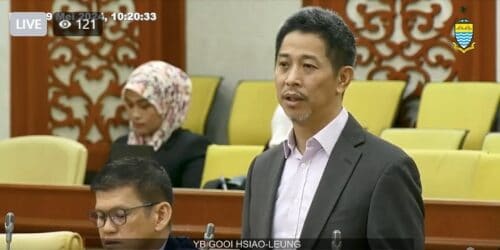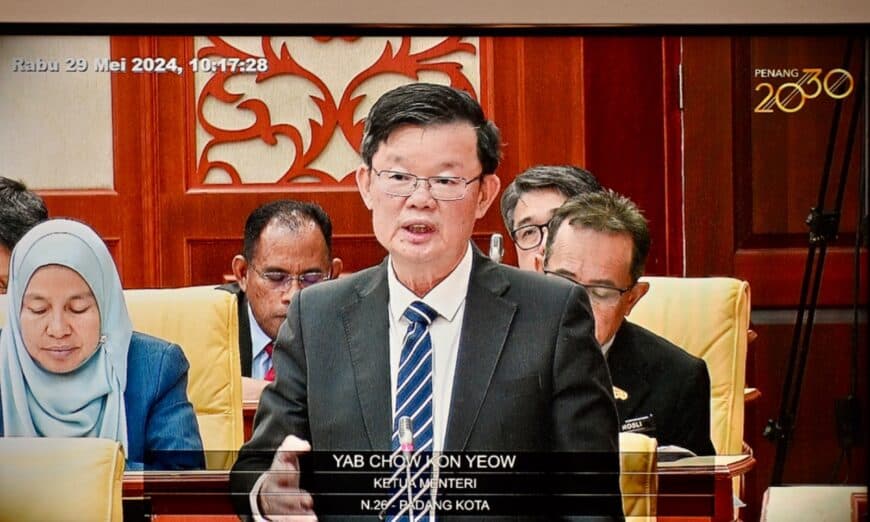PENANG is requesting that 20% of the taxes collected by the Federal Government from Penang be allocated to the state government to enhance its development efforts.
Chief Minister Chow Kon Yeow said it was time to review the Federal Government’s allocation to the states.
“We acknowledge that Penang is among the more advanced states regarding Electrical and Electronics (E&E), and semiconductor ecosystems.
“We are ready to support and make Malaysia’s National Semiconductor Strategy (NSS) successful.
“Generally, the growth of these industries will have a spillover effect on the economy as well as other sectors such as real estate values, high-valued job opportunities, transportation, services, recreation, and others.
“These will spur development in the state,” he replied to a supplementary question by Gooi Hsiao-Leung (PH-Bukit Tengah) during the State Legislative Assembly sitting today.
Chow said, however, that most of these yields are channelled to the Federal Government.
“We take an example of the taxes collected from taxpayers in Penang by the Inland Revenue Board (LHDN).
“I was informed that LHDN collects an average of RM8 billion from taxpayers in Penang annually. We have other taxes collected by the Federal Government from Penang but let us take only this example.
“If 20% of RM8 billion is to be allocated to the state government, the state government would have RM1.6 billion annually to enhance its development efforts,” he said.
He explained that the project announcements by the Federal Government are separate matters.
Chow stated that with the rapid development of the semiconductor industry, Penang urgently needs essential funds from the Federal Government to be returned to the state. This would enable Penang to implement programmes and projects more effectively.
According to the data provided by the Malaysian Investment Development Authority (MIDA), Chow revealed that the manufacturing foreign direct investments (FDIs) for the E&E sector in Penang were as follows – RM1.8 billion (2018); RM9.5 billion (2019); RM4.2 billion (2020); RM73.5 billion (2021); RM5.2 billion (2022); and RM53.3 billion (2023).
“The state government has been working diligently to ensure that Penang remains competitive in the semiconductor industry.
“The Penang government is focused on transforming the region into a global high-tech hub by expanding existing E&E and semiconductor industries while also developing the supply chain for front-end manufacturing equipment.
“Additionally, there is an emphasis on promoting research and development (R&D) and design activities, as well as in digitalisation, to create high-value and sustainable industries, fostering skilled job creation and income generation.
“Crucially, Penang aims to become an Environmental, Social & Governance (ESG)-oriented state, recognising the importance of ESG standards for potential investors. The government encourages green practices in construction and manufacturing processes, such as utilising green building designs, rain harvesting, natural ventilation, tree planting, and recycling,” he replied to Gooi’s earlier question.

He added that the state government, through the Penang Development Corporation (PDC), is establishing new world-class industrial parks, including Bandar Cassia Technology Park, Batu Kawan Industrial Park III, and Penang Science Park South, totalling over 800 acres.
“InvestPenang is enhancing the ‘Hand Holding Programme’ to support new investors in Penang, assisting in business establishment, licensing, factory construction, and operations.
“This initiative aims to maintain Penang’s competitiveness compared to other locations like Singapore, Vietnam, Thailand, and Indonesia.
“Moreover, the ‘Penang IC Design and Digital Park’ has been launched to attract high-impact projects in IC design, R&D, Global Business Services (GBS), digital technology investments, and Circular Digital Economy Ecosystem, fostering innovation and attracting talent to Penang,” he said.
Story by Christopher Tan

